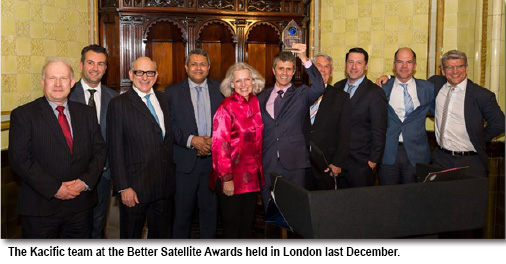Guess Who is “MINDING THE GAP?”
By Lou Zacharilla*
 New York City, January 3, 2019--I cannot say truthfully that the taste of kava will rival Veuve Clicquot, a smooth Italian Amarone or a glass of New York City tap water for that matter. But kava does give you a sedating buzz that is a combination of novocaine on top of an hour of Zen meditation.
New York City, January 3, 2019--I cannot say truthfully that the taste of kava will rival Veuve Clicquot, a smooth Italian Amarone or a glass of New York City tap water for that matter. But kava does give you a sedating buzz that is a combination of novocaine on top of an hour of Zen meditation.
I know because I had my first taste of it in 2018 during this year’s annual Better Satellite World awards in London thanks to the nation of Vanuatu. It was a heady night, as always.
The Nobel Laureate and environmental activist Al Gore said that the “only true, inexhaustible natural resource is human intelligence.”
If Al is right (and some very intelligent people, including members of the 2018 UN Broadband Commission’s report at the Mobile World Congress event in Spain, have in more bureaucratic jargon echoed his theory) you only need to look at the state of the much-discussed “digital divide” to see that we are still leaving a hell of lot of “oil” in the ground and bushels of “peaches” to rot.
Over 50% of the people on this planet, all of whom presumably are children of god, entitled to human rights and economic contributors still do not have affordable, adequate or ANY access to broadband. We know the familiar mantra. We hear it often from our own lips and increasingly those of the political class and media pundits.
But when we started to hear it from the “smart money” the ground shifted. People who put their money and their mouths where their minds are seemed to shake loose a paradigm that seemed glued. You know the litany of names who have barged into the space and satellite industry: Gates, Bezos, Musk and Wyler. You may not know others who are among the intellectual architects of this initiative, such as Madame Suvi Linden, former Commissioner of Communications of Finland (an Intelligent Community Visionary of the Year for legislate the effort to declare Broadband a human right) and Philipp Metzger, Director General of the Federal Office of Communications (OFCOM) of Switzerland who earlier in the year helped orchestrate and present an important report for policy makers and regulators on ways to close the digital divide.
Combined, the momentum for “minding the gap” that separates billions of us from our potential has been accelerated by the satellite industry. Since connectivity is the first step to building the refinery of the mind that Mr. Gore spoke of, it is not a surprise that satellites are involved. While connectivity is not the final step to the successful development of regions and communities toward sustainable economic and social goals, none of it will happen without satellite playing a major role.
In London, at the SSPI’s Better Satellite World awards, hosted by Milbank Law and the SSPI UK Chapter, there was an informal theme in 2018, “How Satellite is Minding the Gap.” Everywhere satellite is helping people and places take an important first step.
This was the reason I had my first encounter with kava, a drink used to celebrate important events on the Pacific Island of Vanuatu.
 Along with the initiators and satellite operator signatories of the Crisis Connectivity Charter, a major game-changing capacity agreement that will improve response times after disasters; Goonhilly Earth Station and Leeds University, which teamed to run a program that systematically trains young Africans to become entrepreneurial change agents back home; and Greg Wyler, named the UK’s Personality of the Year by SSPI’s UK Chapter - and who will only need an introduction if OneWeb fails (LOL) – Kacific Broadband Satellite also received the award.
Along with the initiators and satellite operator signatories of the Crisis Connectivity Charter, a major game-changing capacity agreement that will improve response times after disasters; Goonhilly Earth Station and Leeds University, which teamed to run a program that systematically trains young Africans to become entrepreneurial change agents back home; and Greg Wyler, named the UK’s Personality of the Year by SSPI’s UK Chapter - and who will only need an introduction if OneWeb fails (LOL) – Kacific Broadband Satellite also received the award.
With the founding investors of the venture on hand, including Candace Johnson, a co-initiator for the founding of SES Global and Christian Patroux, Kacific’s CEO, Vanuatu’s Ambassador to the European Union, the Honorable John Licht, whipped up a batch of something brown and liquid at a private ceremony prior to the Reception and Awards Dinner. Yeah, kava.
The best poetry is often uttered under the influence. And so it was that 30 minutes later I was relaxed enough to tell a sold-out room that in four short years that Kacific, with the help of Boeing and SpaceX, has begun to drive the spikes for the “new railroad” of the Pacific Islands. Kacific-1 will bring more payload and faster service at lower cost. It must. The stakes are high. And Kacific understands this, as did the others received the Better Satellite World awards before them.
Perhaps Kacific’s model will infiltrate more of our industry which sells broadband capacity through partners. Patroux and his partners were very clear that to be successful providers of telecom and broadband services are expected to evolve into “stakeholders” in the future of the places they serve. This is not only about selling satellite capacity this time. It is about tapping the endless resource.
-----------------------------------------
 Lou Zacharilla is the Director of Innovation and Development of the Space and Satellite Professionals International (SSPI). He can be reached at: LZacharilla@sspi.org.
Lou Zacharilla is the Director of Innovation and Development of the Space and Satellite Professionals International (SSPI). He can be reached at: LZacharilla@sspi.org.





